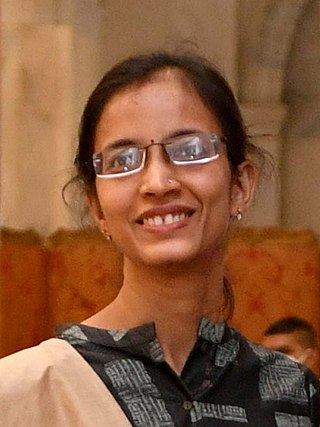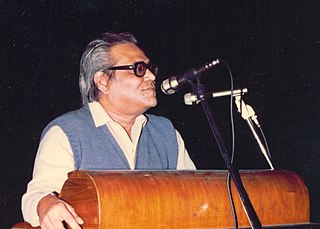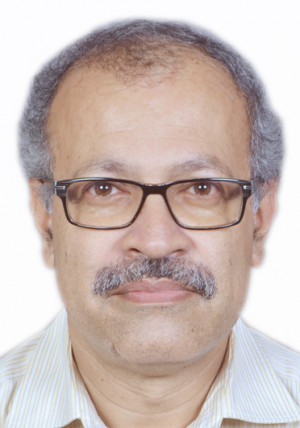
The TIFR Centre for Applicable Mathematics is part of the School of Mathematics of the Tata Institute of Fundamental Research.
Prabhu Lal Bhatnagar, commonly addressed as P. L. Bhatnagar, was an Indian mathematician known for his contribution to the Bhatnagar–Gross–Krook operator used in Lattice Boltzmann methods (LBM).
Anadi Sankar Gupta was an Indian mathematician. Till his death, he was an INSA Senior Scientist and emeritus faculty with the Department of Mathematics, IIT Kharagpur.

Neena Gupta is a professor at the Statistics and Mathematics Unit of the Indian Statistical Institute (ISI), Kolkata. Her primary fields of interest are commutative algebra and affine algebraic geometry.

Amar Nath Bhaduri (1935–2003) was an Indian molecular enzymologist and chemical biologist, known for his studies on UDP-glucose 4-epimerase, a homodimeric epimerase found in cells and his work on Leishmania donovani, the protozoal pathogen for Kala-azar. He was the director of the Indian Institute of Chemical Biology (IICB), Kolkata and an elected fellow of the Indian National Science Academy and the Indian Academy of Sciences. The Council of Scientific and Industrial Research, the apex agency of the Government of India for scientific research, awarded him the Shanti Swarup Bhatnagar Prize for Science and Technology, one of the highest Indian science awards, in 1978, for his contributions to biological sciences.
Suryanarayanasastry Ramasesha is an Indian quantum chemist and a former Dean of the Faculty of Science at the Indian Institute of Science. He is a former chair of the Solid State and Structural Chemistry Unit and Amrut Modi Chair professor of Chemical Sciences at IISc. He is known for his studies on conjugated organic systems and low-dimensional solids and is an elected fellow of the Indian National Science Academy, the Indian Academy of Sciences and The World Academy of Sciences. The Council of Scientific and Industrial Research, the apex agency of the Government of India for scientific research, awarded him the Shanti Swarup Bhatnagar Prize for Science and Technology, one of the highest Indian science awards, in 1992, for his contributions to chemical sciences.
Akhil Ranjan Chakravarty is an Indian organic chemist and a professor at the department of inorganic and physical chemistry at the Indian Institute of Science. He is known for his researches on reactivity and bonding in multicentered systems and is an elected fellow of the Indian National Science Academy and the Indian Academy of Sciences The Council of Scientific and Industrial Research, the apex agency of the Government of India for scientific research, awarded him the Shanti Swarup Bhatnagar Prize for Science and Technology, one of the highest Indian science awards, in 1998, for his contributions to chemical sciences.
Deb Shankar Ray is an Indian physical chemist and professor at the department of physical chemistry of the Indian Association for the Cultivation of Science, Kolkata. He is known for his researches on non-linear dynamics and theoretical spectroscopy and is an elected fellow of the Indian National Science Academy West Bengal Academy of Science and Technology and the Indian Academy of Sciences The Council of Scientific and Industrial Research, the apex agency of the Government of India for scientific research, awarded him the Shanti Swarup Bhatnagar Prize for Science and Technology, one of the highest Indian science awards, in 1999, for his contributions to chemical sciences.
Swapan Kumar Pati is an Indian quantum chemist, a professor of the department of chemistry at the Jawaharlal Nehru Centre for Advanced Scientific Research and the head of the Quantum Theory Molecules to Materials Group at the institute. He is known for his studies on electronic optical and magnetic phenomena in molecular systems and is an elected fellow of the Indian Academy of Sciences, National Academy of Sciences, India and The World Academy of Sciences. The Council of Scientific and Industrial Research, the apex agency of the Government of India for scientific research, awarded him the Shanti Swarup Bhatnagar Prize for Science and Technology, one of the highest Indian science awards, in 2010, for his contributions to chemical sciences.
Rajinder Kumar is an Indian chemical engineer and a former professor at the Indian Institute of Science. He is known for his studies on multiphase phenomena and is an elected fellow of the Indian National Science Academy, Indian Academy of Sciences, and the Indian National Academy of Engineering. The Council of Scientific and Industrial Research, the apex agency of the Government of India for scientific research, awarded him the Shanti Swarup Bhatnagar Prize for Science and Technology, one of the highest Indian science awards for his contributions to Engineering Sciences in 1976. He received the third highest Indian civilian award of the Padma Bhushan in 2003. He is also a recipient of Om Prakash Bhasin Award and the VASVIK Industrial Research Award.
Vivek Shripad Borkar is an Indian electrical engineer, mathematician and an Institute chair professor at the Indian Institute of Technology, Mumbai. He is known for introducing analytical paradigm in stochastic optimal control processes and is an elected fellow of all the three major Indian science academies viz. the Indian Academy of Sciences, Indian National Science Academy and the National Academy of Sciences, India. He also holds elected fellowships of The World Academy of Sciences, Institute of Electrical and Electronics Engineers, Indian National Academy of Engineering and the American Mathematical Society. The Council of Scientific and Industrial Research, the apex agency of the Government of India for scientific research, awarded him the Shanti Swarup Bhatnagar Prize for Science and Technology, one of the highest Indian science awards for his contributions to Engineering Sciences in 1992. He received the TWAS Prize of the World Academy of Sciences in 2009.
Ramarathnam Narasimhan is an Indian materials engineer and a professor at the Department of Mechanical Engineering of the Indian Institute of Science. He is known for his pioneering researches on fracture mechanics and is an elected fellow of the Indian Academy of Sciences, Indian National Science Academy and the Indian National Academy of Engineering. The Council of Scientific and Industrial Research, the apex agency of the Government of India for scientific research, awarded him the Shanti Swarup Bhatnagar Prize for Science and Technology, one of the highest Indian science awards for his contributions to Engineering Sciences in 1999.

Soumitro Banerjee is an Indian electrical engineer and a professor at the Department of Physical Sciences of the Indian Institute of Science Education and Research, Kolkata. He is known for his studies on bifurcation phenomena in power electronic circuits and is an elected fellow of all three major Indian science academies: the National Academy of Sciences, India, Indian Academy of Sciences, and Indian National Science Academy. He is also a fellow of The World Academy of Sciences, Institute of Electrical and Electronics Engineers, West Bengal Academy of Sciences and the Indian National Academy of Engineering. The Council of Scientific and Industrial Research, the apex agency of the Government of India for scientific research, awarded him the Shanti Swarup Bhatnagar Prize for Science and Technology, one of the highest Indian science awards for his contributions to Engineering Sciences in 2003.
Perdur Radhakantha Adiga was an Indian endocrine biochemist, reproductive biologist, INSA Senior Scientist and an Astra chair professor of the Indian Institute of Science. He was known for his researches on vitamin-carrier proteins and Lathyrus sativus and was an elected fellow of the Indian Academy of Sciences and the Indian National Science Academy. The Council of Scientific and Industrial Research, the apex agency of the Government of India for scientific research, awarded him the Shanti Swarup Bhatnagar Prize for Science and Technology, one of the highest Indian science awards for his contributions to Medical Sciences in 1980.
Krityunjai Prasad Sinha was an Indian theoretical physicist and an emeritus professor of Indian Institute of Science. Known for his research in solid state physics and cosmology, Sinha was an elected fellow of all the three major Indian science academies – the Indian National Science Academy, the Indian Academy of Sciences, and the National Academy of Sciences, India. In 1974, the Council of Scientific and Industrial Research, the apex agency of the Government of India for scientific research, awarded him the Shanti Swarup Bhatnagar Prize for Science and Technology, one of the highest Indian science awards, for his contributions to physical sciences.
Biswa Ranjan Nag was an Indian physicist and the Sisir Kumar Mitra chair professor at Rajabazar Science College, University of Calcutta. Known for his research in semiconductor physics, Nag was an elected fellow of Indian National Science Academy and Indian Academy of Sciences. The Council of Scientific and Industrial Research, the apex agency of the Government of India for scientific research, awarded him the Shanti Swarup Bhatnagar Prize for Science and Technology, one of the highest Indian science awards for his contributions to Physical Sciences in 1974.
Muthusamy Lakshmanan is an Indian theoretical physicist currently working as Professor of Eminence at the Department of Nonlinear Dynamics of Bharathidasan University. Presently he is the DST-SERB National Science Chair awarded by Science and Engineering Research Board, Department of Science and Technology. He has held several research fellowships which included Raja Rammanna fellowship of Department of Atomic Energy, Alexander von Humboldt fellowship, Japan Society for the Promotion of Science fellowship, Royal Society Nuffield Foundation fellowship, and NASI-Senior Scientist Platinum Jubilee Fellowship. In the year 2021, on August 15, he was conferred with Dr. A. P. J Abdul Kalam Award by the Government of Tamil Nadu.
Rahul Pandit is an Indian condensed matter physicist, a professor of physics and a divisional chair at the Indian Institute of Science. Known for his research on phase transitions and spatiotemporal chaos and turbulence, Pandit is an elected fellow of the Indian Academy of Sciences, Indian National Science Academy and The World Academy of Sciences. The Council of Scientific and Industrial Research, the apex agency of the Government of India for scientific research, awarded him the Shanti Swarup Bhatnagar Prize for Science and Technology, one of the highest Indian science awards, for his contributions to physical sciences in 2001.

Aditi Sen De is an Indian scientist, a professor in quantum information and computation group at the Harish-Chandra Research Institute, Allahabad. She was born on 1st October 1974 in Kolkata, India. She is known for her research on quantum information and computation, quantum communication including quantum cryptography, quantum optics and many-body physics. The Council of Scientific and Industrial Research, the apex agency of the Government of India for scientific research, awarded her the Shanti Swarup Bhatnagar Prize for Science and Technology for her contributions to physical sciences in 2018. She is the first female physicist to be given this honour. In 2022, she was elected as a member of Indian Academy of Sciences and Indian National Science Academy.

The University College of Science, Technology and Agriculture are two of five main campuses of the University of Calcutta (CU). The college served as the cradle of Indian Sciences by winning the Nobel Prize in Physics in 1930 and many fellowships of the Royal Society London.






